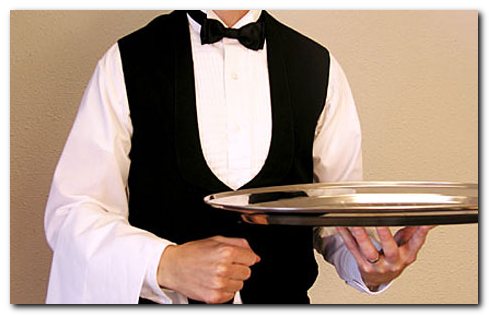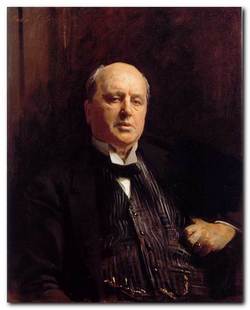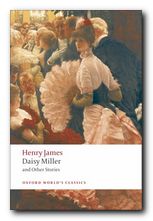tutorial, commentary, study resources, and web links
Brooksmith first appeared in Harper’s Weekly and Black and White in May 1891 – a sure sign that Henry James was attentive to the commercial opportunities of simultaneous publication – getting paid for the same story twice over.
James has always been known as a writer of refined sensibility, with a prose style renowned for its demanding complexities and subtelties of meaning; but it is often forgotten that he was a full-time writer who made a considerable part of his income from professional contracts with publishers. Despite the aesthetic demands he sometimes made of his readers, he had one eye closely on the literary marketplace.

Brooksmith – critical commentary
Brooksmith is not much more than a light character sketch, but it is composed in a delicately constructed arc – of the narrator’s appreciation of Brooksmith’s position in society. It starts from the narrator’s realization that Offord’s salon owes its success to Brooksmith’s sensitive ministrations. Brooksmith has become sufficiently attuned to Offord’s sophisticated culture that he is able to anticipate his needs.
Then as Offord himself declines the narrator becomes even more appreciative of Brooksmith as they form a complicit understanding of their relative positions. The narrator also begins to worry about Brooksmith’s future prospects. He realises it will be almost impossible to locate employment offering such a cultivated milieu.
The arc reaches its peak on the death of Offord, and from that point onwards Brooksmith begins his slow decline. He goes from one lower status position to another, at each step sliding down the social scale, until he disappears from society altogether. The narrator’s conclusion (which seems somewhat callous) is that ‘he had indeed been spoiled’.
Brooksmith – study resources
![]() The Complete Works of Henry James – Kindle edition – Amazon UK
The Complete Works of Henry James – Kindle edition – Amazon UK
![]() The Complete Works of Henry James – Kindle edition – Amazon US
The Complete Works of Henry James – Kindle edition – Amazon US
![]() Complete Stories 1884—1891 – Library of America – Amazon UK
Complete Stories 1884—1891 – Library of America – Amazon UK
![]() Complete Stories 1884—1891 – Library of America – Amazon US
Complete Stories 1884—1891 – Library of America – Amazon US
![]() The Complete Tales of Henry James – Volume 8 – Digireads reprint – UK
The Complete Tales of Henry James – Volume 8 – Digireads reprint – UK
![]() The Cambridge Companion to Henry James – Amazon UK
The Cambridge Companion to Henry James – Amazon UK
![]() Brooksmith – eBook formats at Project Gutenberg
Brooksmith – eBook formats at Project Gutenberg
Brooksmith – plot summary
An anonymous narrator reflects on the successful salon maintained by his friend Oliver Offord, a retired diplomat. He wonders how the success is created and concludes that it is the subtle and tactful influence of Offord’s butler, Brooksmith.
When Offord falls ill and receives fewer visitors, the narrator begins to worry what will become of Brooksmith, who is so much a part of the establishment. When Offord dies, Brooksmith is left eighty pounds, but his employment and role disappear.
The narrator encounters Brooksmith amongst the staff at various other houses, and always feels a sympathetic sadness thatBrooksmith is working at a level which demeans his true value. Brooksmith eventually falls ill, but the narrator is still unable to help him.
Brooksmith gradually falls down the social order of the servant class and is last encountered as a casual waiter-on at a society dinner. No more is heard of him until a poor relative visits the narrator to report that Brooksmith has simply disappeared, and is presumed dead.
Principal characters
| I | the anonymous narrator |
| Oliver Offord | a bachelor and retired diplomat |
| Brooksmith | his butler and intimate friend (35) |

Henry James – portrait by John Singer Sargeant
Further reading
Biographical
![]() Theodora Bosanquet, Henry James at Work, University of Michigan Press, 2007.
Theodora Bosanquet, Henry James at Work, University of Michigan Press, 2007.
![]() F.W. Dupee, Henry James: Autobiography, Princeton University Press, 1983.
F.W. Dupee, Henry James: Autobiography, Princeton University Press, 1983.
![]() Leon Edel, Henry James: A Life, HarperCollins, 1985.
Leon Edel, Henry James: A Life, HarperCollins, 1985.
![]() Philip Horne (ed), Henry James: A Life in Letters, Viking/Allen Lane, 1999.
Philip Horne (ed), Henry James: A Life in Letters, Viking/Allen Lane, 1999.
![]() Henry James, The Letters of Henry James, Adamant Media Corporation, 2001.
Henry James, The Letters of Henry James, Adamant Media Corporation, 2001.
![]() Fred Kaplan, Henry James: The Imagination of Genius, Johns Hopkins University Press, 1999
Fred Kaplan, Henry James: The Imagination of Genius, Johns Hopkins University Press, 1999
![]() F.O. Matthieson (ed), The Notebooks of Henry James, Oxford University Press, 1988.
F.O. Matthieson (ed), The Notebooks of Henry James, Oxford University Press, 1988.
Critical commentary
![]() Ian F.A. Bell, Henry James and the Past, London: Palgrave Macmillan, 1993.
Ian F.A. Bell, Henry James and the Past, London: Palgrave Macmillan, 1993.
![]() Millicent Bell, Meaning in Henry James, Cambridge (MA): Harvard University Press, 1993.
Millicent Bell, Meaning in Henry James, Cambridge (MA): Harvard University Press, 1993.
![]() Harold Bloom (ed), Modern Critical Views: Henry James, Chelsea House Publishers, 1991.
Harold Bloom (ed), Modern Critical Views: Henry James, Chelsea House Publishers, 1991.
![]() Kirstin Boudreau, Henry James’s Narrative Technique, Macmillan, 2010.
Kirstin Boudreau, Henry James’s Narrative Technique, Macmillan, 2010.
![]() Daniel Mark Fogel, A Companion to Henry James Studies, Greenwood Press, 1993.
Daniel Mark Fogel, A Companion to Henry James Studies, Greenwood Press, 1993.
![]() Jonathan Freedman, The Cambridge Companion to Henry James, Cambridge University Press, 1998.
Jonathan Freedman, The Cambridge Companion to Henry James, Cambridge University Press, 1998.
![]() Roger Gard (ed), Henry James: The Critical Heritage, London: Routledge, 1968.
Roger Gard (ed), Henry James: The Critical Heritage, London: Routledge, 1968.
![]() Tessa Hadley, Henry James and the Imagination of Pleasure, Cambridge University Press, 2009.
Tessa Hadley, Henry James and the Imagination of Pleasure, Cambridge University Press, 2009.
![]() Richard A. Hocks, Henry James: A study of the short fiction, New York: Twayne Publishers, 1990.
Richard A. Hocks, Henry James: A study of the short fiction, New York: Twayne Publishers, 1990.
![]() Colin Meissner, Henry James and the Language of Experience, Cambridge University Press, 2009
Colin Meissner, Henry James and the Language of Experience, Cambridge University Press, 2009
![]() John Pearson (ed), The Prefaces of Henry James, Pennsylvania State University Press, 1993.
John Pearson (ed), The Prefaces of Henry James, Pennsylvania State University Press, 1993.
![]() Richard Poirer, The Comic Sense of Henry James, Oxford: Oxford University Press, 1967.
Richard Poirer, The Comic Sense of Henry James, Oxford: Oxford University Press, 1967.
![]() Ruth Yeazell (ed), Henry James: A Collection of Critical Essays, Longmans, 1994.
Ruth Yeazell (ed), Henry James: A Collection of Critical Essays, Longmans, 1994.
Other works by Henry James
 The Aspern Papers (1888) is a psychological drama set in Venice which centres on the tussle for control of a great writer’s correspondence. An elderly lady, ex-lover of the writer, seeks a husband for her daughter. But the potential purchaser of the papers is a dedicated bachelor. Money is also at stake – but of course not discussed overtly. There is a refined battle of wills between them. Who will win in the end? As usual, James keeps the reader guessing. The novella is a masterpiece of subtle narration, with an ironic twist in its outcome. This collection of stories also includes three of his accomplished long short stories – The Private Life, The Middle Years, and The Death of the Lion.
The Aspern Papers (1888) is a psychological drama set in Venice which centres on the tussle for control of a great writer’s correspondence. An elderly lady, ex-lover of the writer, seeks a husband for her daughter. But the potential purchaser of the papers is a dedicated bachelor. Money is also at stake – but of course not discussed overtly. There is a refined battle of wills between them. Who will win in the end? As usual, James keeps the reader guessing. The novella is a masterpiece of subtle narration, with an ironic twist in its outcome. This collection of stories also includes three of his accomplished long short stories – The Private Life, The Middle Years, and The Death of the Lion.
![]() Buy the book from Amazon UK
Buy the book from Amazon UK
![]() Buy the book from Amazon US
Buy the book from Amazon US
 The Spoils of Poynton (1896) is a short novel which centres on the contents of a country house, and the question of who is the most desirable person to inherit it via marriage. The owner Mrs Gereth is being forced to leave her home to make way for her son and his greedy and uncultured fiancee. Mrs Gereth develops a subtle plan to take as many of the house’s priceless furnishings with her as possible. But things do not go quite according to plan. There are some very witty social ironies, and a contest of wills which matches nouveau-riche greed against high principles. There’s also a spectacular finale in which nobody wins out.
The Spoils of Poynton (1896) is a short novel which centres on the contents of a country house, and the question of who is the most desirable person to inherit it via marriage. The owner Mrs Gereth is being forced to leave her home to make way for her son and his greedy and uncultured fiancee. Mrs Gereth develops a subtle plan to take as many of the house’s priceless furnishings with her as possible. But things do not go quite according to plan. There are some very witty social ironies, and a contest of wills which matches nouveau-riche greed against high principles. There’s also a spectacular finale in which nobody wins out.
![]() Buy the book from Amazon UK
Buy the book from Amazon UK
![]() Buy the book from Amazon US
Buy the book from Amazon US
 Daisy Miller (1879) is a key story from James’s early phase in which a spirited young American woman travels to Europe with her wealthy but commonplace mother. Daisy’s innocence and her audacity challenge social conventions, and she seems to be compromising her reputation by her independent behaviour. But when she later dies in Rome the reader is invited to see the outcome as a powerful sense of a great lost potential. This novella is a great study in understatement and symbolic power, and it has rightly gained a reputation as an oustanding example of the literary genre.
Daisy Miller (1879) is a key story from James’s early phase in which a spirited young American woman travels to Europe with her wealthy but commonplace mother. Daisy’s innocence and her audacity challenge social conventions, and she seems to be compromising her reputation by her independent behaviour. But when she later dies in Rome the reader is invited to see the outcome as a powerful sense of a great lost potential. This novella is a great study in understatement and symbolic power, and it has rightly gained a reputation as an oustanding example of the literary genre.
![]() Buy the book from Amazon UK
Buy the book from Amazon UK
![]() Buy the book from Amazon US
Buy the book from Amazon US
© Roy Johnson 2013
Henry James – web links
![]() Henry James at Mantex
Henry James at Mantex
Biographical notes, study guides, tutorials on the Complete Tales, book reviews. bibliographies, and web links.
![]() The Complete Works
The Complete Works
Sixty books in one 13.5 MB Kindle eBook download for £1.92 at Amazon.co.uk. The complete novels, stories, travel writing, and prefaces. Also includes his autobiographies, plays, and literary criticism – with illustrations.
![]() The Ladder – a Henry James website
The Ladder – a Henry James website
A collection of eTexts of the tales, novels, plays, and prefaces – with links to available free eTexts at Project Gutenberg and elsewhere.
![]() A Hyper-Concordance to the Works
A Hyper-Concordance to the Works
Japanese-based online research tool that locates the use of any word or phrase in context. Find that illusive quotable phrase.
![]() The Henry James Resource Center
The Henry James Resource Center
A web site with biography, bibliographies, adaptations, archival resources, suggested reading, and recent scholarship.
![]() Online Books Page
Online Books Page
A collection of online texts, including novels, stories, travel writing, literary criticism, and letters.
![]() Henry James at Project Gutenberg
Henry James at Project Gutenberg
A major collection of eTexts, available in a variety of eBook formats.
![]() The Complete Letters
The Complete Letters
Archive of the complete correspondence (1855-1878) work in progress – published by the University of Nebraska Press.
![]() The Scholar’s Guide to Web Sites
The Scholar’s Guide to Web Sites
An old-fashioned but major jumpstation – a website of websites and resouces.
![]() Henry James – The Complete Tales
Henry James – The Complete Tales
Tutorials on the complete collection of over one hundred tales, novellas, and short stories.
![]() Henry James on the Internet Movie Database
Henry James on the Internet Movie Database
Adaptations of James’s novels and stories for the cinema and television – in various languages. Full details of directors and actors, production features, film reviews, box office, and even quizzes.
More tales by James
More on literature
More on the novella
More on literary studies
More on short stories
